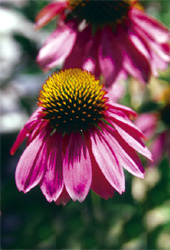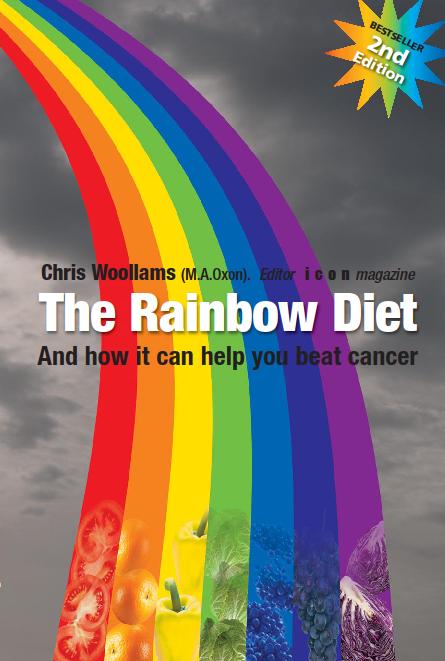Echinacea, also called purple coneflower, is one of the most popular herbs worldwide; native to Eastern and central North America, it was a treatment for Native Americans and today it is best known as an anti-inflammatory, pain-relief, migraine-relief, cold and 'flu herbal remedy that boosts the immune system.
The Immune-boosting Herb

Echinacea is a member of the Compositae family (the daisy family). Although there are nine members, only three have been widely studied and used. Most common, the purple cornflower, is a native plant to America and was first officially used there in medical practice in 1887. Both the roots and the leaves have medicinal properties.
Echinacea purpurea is a proven immune system boosting herb. It seems to reduce the regulators of your natural T-cells (1). Both root and above ground parts have benefits.
Two other variants have been frequently studied - Echinacea pallida and the American Indian's herb of choice Echinacea augustifolia, largely found in Kansas and Montana. Because it is a native plant it was used in a huge variety of situations. There is even research that it improves the performance and end product of laying hens (2).
Although Echinacea was a favourite of Native American Indians for centuries, it lost its position as an immune system booster when antibiotics came along. Many claims have been made for its excellence in aiding relief from anything from colds to cancer. For example, it has been shown to boost the immune system in response to upper respiratory tract infections (3).
Over the last twenty years it has been the Germans and the Chinese, who have pioneered all the new research work with literally hundreds of studies. This is a very well researched herb!
The German Federal Health Agency has approved Echinacea as a supportive treatment for colds and influenza, hard-to-heal skin wounds and urinary tract infections. Almost all the research uses liquid concentrates, or tinctures. Other research studies have noted an effect in eczema, candidiasis, rheumatoid arthritis and psoriasis.
Echinacea improves the immune system
Echinacea boosts the immune system directly due to a number of active chemicals like polysaccharides, alkylamides, flavenoids, caffeic acid derivatives, polyacetylenes and essential oils like rosmarinic acid. For example, arabinogalactan, is a very powerful immuno-modulating polysaccharide and is effective in activating macrophages, interleukin and interferon with an increase in T-cell activity. It can boost the immune system to attack and kill microbes, cause cancer cell death and more and more studies are showing positive effects with brain tumours. Not surprisingly there is research on its abilities to boost scavenger macrophage activity (4).
Several studies have indicated this increase in levels of interferon, whilst highlighting increases in the ingestion of foreign particles by the white cells (phagocytosis).
The University of Munich has shown that it stimulates interleukin and increases levels of white B and lymphocytes, the latter (the cells that can hunt down cancer cells) by 30 per cent.
Echinacea and cancer?
In 1999 a paper by M J Verhoef (Neurology, volume 52), reported the successful study of Echinacea in neurological disease and in brain tumours, and this led scientists to refocus their attentions to cancer.
In cancer, it also seems to help during or after radiotherapy, where research (5) shows that it can provide faster recovery. Japanese research found that Echinacea suppressed radiation-induced leukopenia, especially on monocytes and lymphocytes and resulted in faster recovery from radiotherapy. There are no studies, to our knowledge, showing Echinacea enhances chemotherapy, in fact, with some drugs it might work against effectiveness. However, Echinacea would provide a good way of boosting the immune system after chemotherapy has finished, in the same ways as the Japanese study found.
It might reduce secondary infection during chemotherapy and radiotherapy, and certainly after.
One interesting development was that Echinacea was one of about six natural compounds being touted with brain cancer, all of which had previous been shown by the same researchers to have a positive effect. The others included soya lecithin, fish oils and turmeric (curcumin).
So is it a cancer cure? No. But it may be helpful in certain areas of your total cancer-fighting programme.
Chris Woollams former Oxford University Biochemist and a founder of CANCERactive writes, "A common misconception is that merely stimulating the immune system will be enough to kick out a cancer. Maybe, in a few cases it will. But, by and large, the problem with cancer is two-fold, the immune system is weak, AND the cancer also evades the immune system by blocking its own surface. We have found this is where beta-glucans can help (6)."
So, Medical Herbalists recognize the need for two therapeutic requirements as essential when treating cancer - an Immuno-modulating effect, and an Adaptogenic effect, and BOTH are required to work synergistically.
In cancer treatment you need more than just Echinacea. For example, Astragalus and Cat's Claw can help.
Echinacea doesn't work?
As usual there are the Big Pharma related studies and servants that are happy to rubbish a natural herb - especially one that has anti-viral benefits - in these virus and immunity-obsessed times. Several of the more recent studies used - wait for it - 'unrefined' Echinacea and 'juice extracts'. No independent and self-respecting scientist and/or herbalist or herbal supplier would use this crud for treatment, let alone a serious scientific study. This is pure non-science and misinformation.
Dosage
Recommended dosage appears to vary from 900 mg to 1200 mg per day divided into three equal doses. No significant side-effects have been reported in the German research, although Echinacea should possibly not be used for more than eight weeks at a time as it thins the blood.
It is also available in capsules and teas.
First Hand experience
Chris Woollams adds, "I witnessed personally that Cat’s claw, astragalus, turmeric (curcumin) and echinacea can be an excellent immune system re-booting combination for cancer patients, especially after treatment with radiotherapy and/or chemotherapy. We gave this combination to Catherine when the chemotherapy drugs had reduced her white cells to desperately low levels, and the standard immune-stimulating drugs and injections on offer simply would not work even though she tried them daily for four weeks. On taking the four herbs her white cell levels recovered in less than two weeks!"
*****
References
1. Immune enhancing effects of Echinacea purpurea root extract by reducing regulatory T cell number and function; Hyung-Ran Kim et al; Nat Prod Commun, 2014 Apr;9(4):511-4 - https://pubmed.ncbi.nlm.nih.gov/24868871/
2. Dietary supplementation of Echinacea purpurea powder improved performance, serum lipid profile, and yolk oxidative stability in laying hens; Elaheh Jahanian et al; Journal of Applied Animal Research 2017 -https://www.tandfonline.com/doi/full/10.1080/09712119.2015.1091344
3. Echinacea for upper respiratory infection; Barrett B, Vohman M, Calabrese C.. J Fam Pract 1999; 48:628-35. https://www.mdedge.com/familymedicine/article/61009/pulmonology/echinacea-upper-respiratory-infections
4. Echinacea increases arginase activity and has anti-inflammatory properties in RAW 264.7 macrophage cells indicative of alternative macrophage activation; Zili Zhai Iowa State, et al; J Ethnopharmacol. 2009 Feb 25; 122(1): 76–85.
5. Antioxidant and immuno-enhancing effects of Echinacea purpurea; Satoshi Mishima et al; Bio Pharm Bull, 2004 Jul;27(7):1004-9. https://pubmed.ncbi.nlm.nih.gov/15256730/#affiliation-1
6. Beta-Glucans, medicinal mushrooms and mother's milk in immunotherapy
 If you are already thinking of buying Echinacea, you might like to look at the Our Natural Selection researched, 'Product of Choice'. You can do this by CLICKING HERE
If you are already thinking of buying Echinacea, you might like to look at the Our Natural Selection researched, 'Product of Choice'. You can do this by CLICKING HERE 

 At last, the definitive, research-based book on how to build a diet to help beat cancer. Click here to read about it.
At last, the definitive, research-based book on how to build a diet to help beat cancer. Click here to read about it.
**********
Please be clear: At CANCERactive we do not consider the above compound to be a cure for cancer, despite what the research says or experts doing the research may claim. The above, is an article on the compound from published research and expert opinion in the public domain. At CANCERactive we do not believe that any single compound (drug, vitamin, whatever) is a cure for cancer. However, we do believe that people can significantly increase their personal odds of survival by building an Integrated Programme of treatments. Equally, cancer prevention is best practiced through a width of measures.